#gazprom
Text
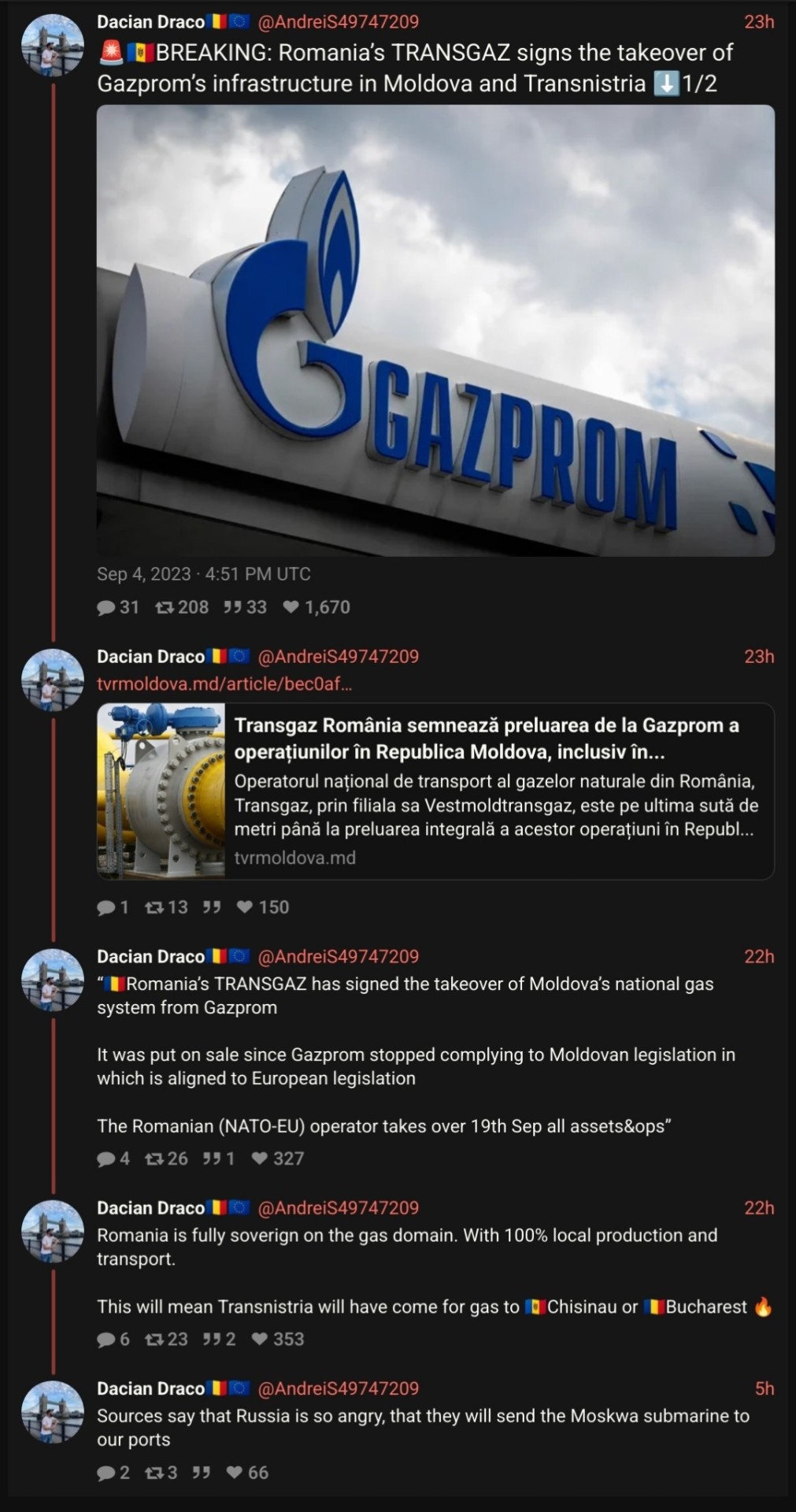
23 notes
·
View notes
Text
6 Evil Corporations and Their Fictional Dystopian Counterparts
This took me a hot minute, but it was totally worth it.
I did some research on 6 corporations and assigned them their very own fictional dystopian corporation.
It's like presenting them all with an award, except the award is shame.
Let's begin.
Speculative fiction is, and always has been, political. So it’s no surprise that so many commentaries on the failures of capitalism draw such striking parallels to existing corporations. Evil corporations, some might say.
I decided to dig up some info on said existing corporations and present some of their, ahem, alleged activities, assigning them their very own dystopian corporations in fiction…
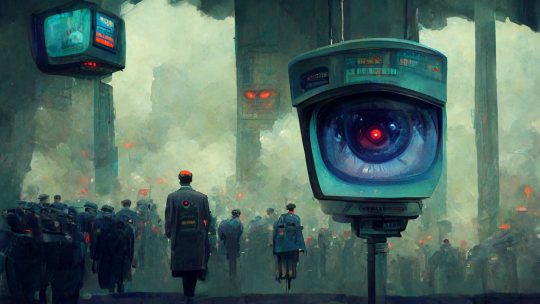
View On WordPress
#Amazon#anticapitalism#Armaco#Bayer#Bayer/Monsanto#Blackwater#Blackwater Contractors#BP#Buy &039;N Large#dystopia#dystopian#Exxon#Gazprom#Johnson & Johnson#Lockheed Martin#Lockheed Martin Corporation#megacorporation#Monsanto#Nestle#sci-fi#science fiction#scifi#Walmart#Wells Fargo#Weyland Yutani
9 notes
·
View notes
Text
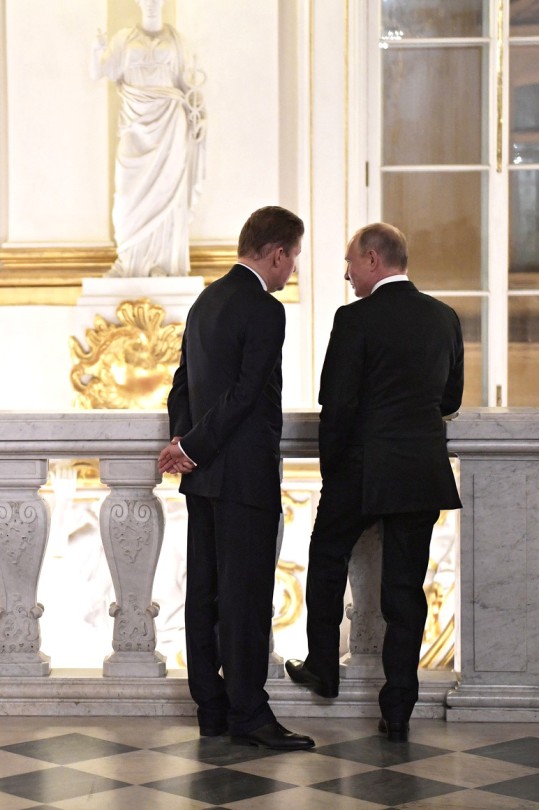
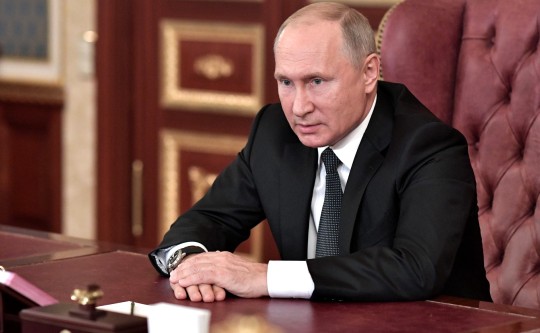
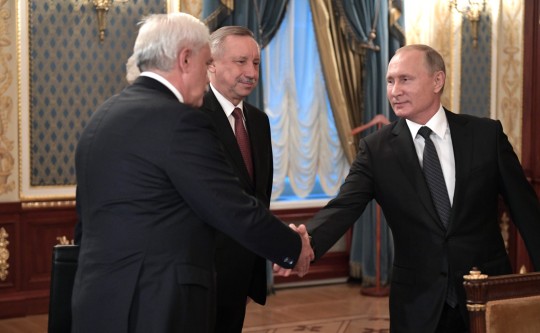
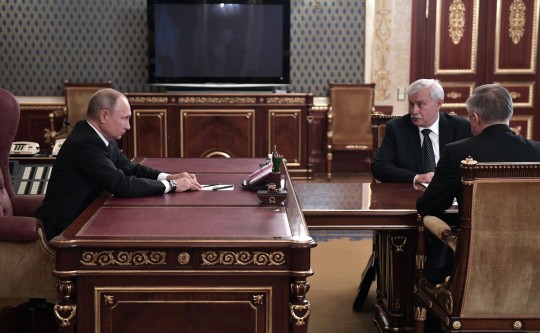

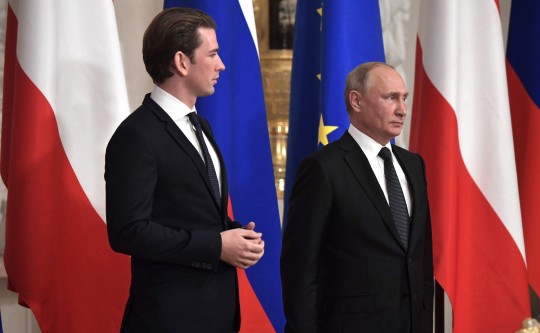

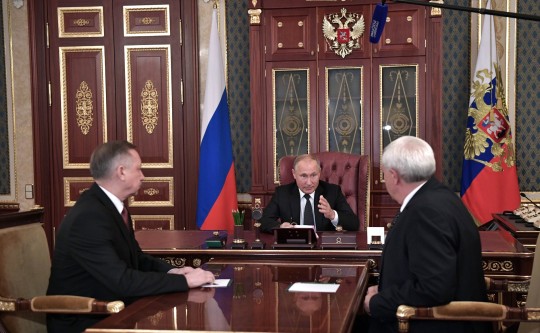
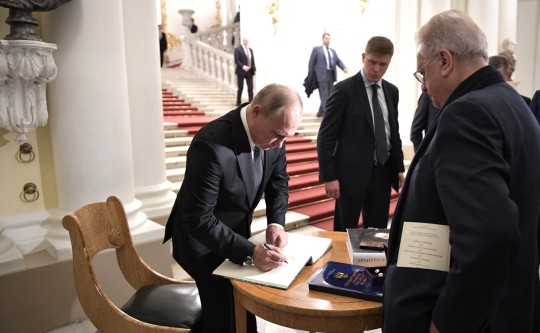
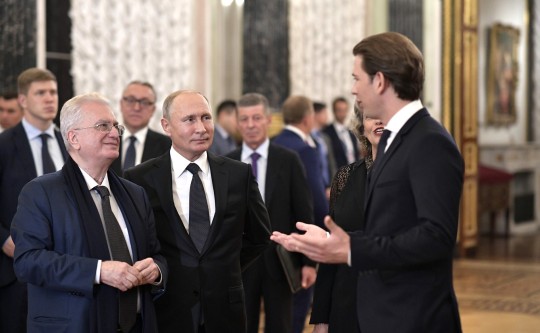
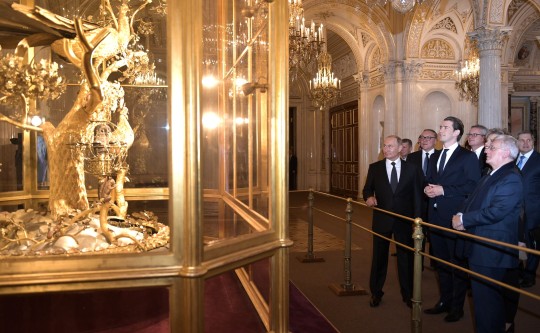
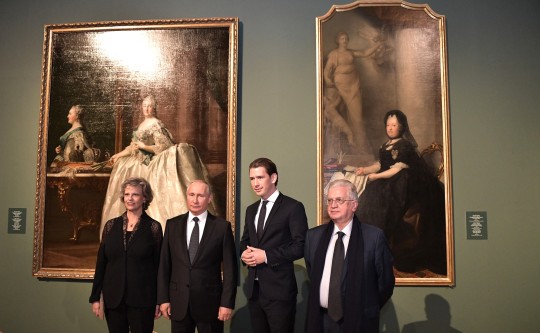
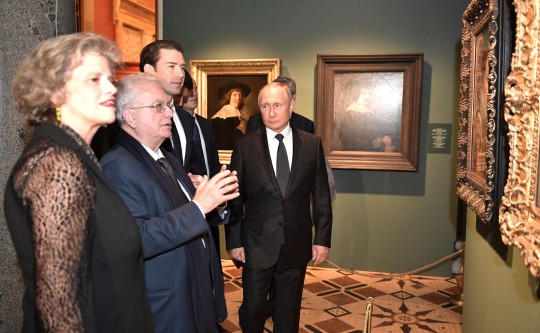
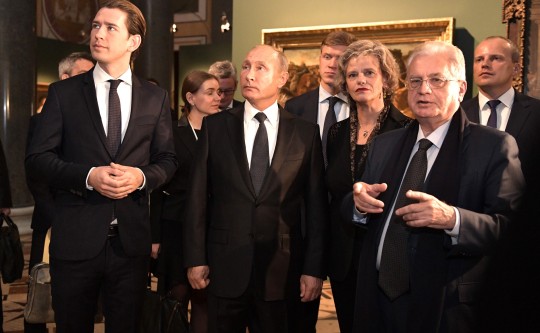

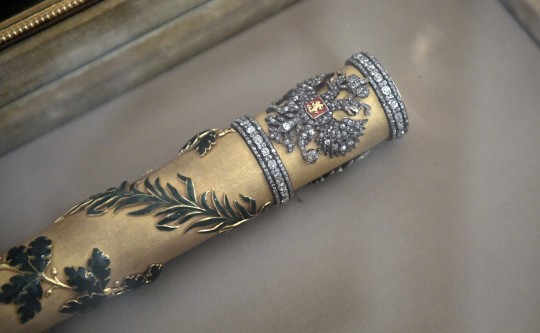
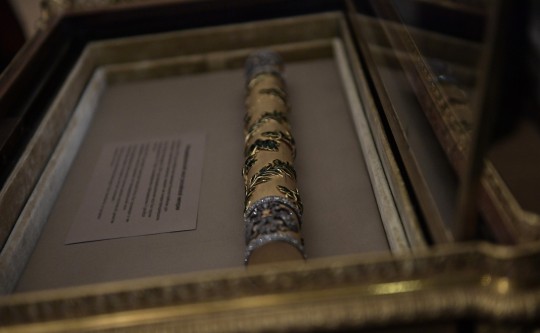


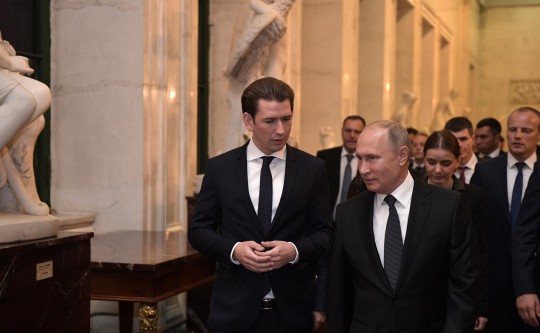

On October 3, 2018, Vladimir Putin had a working meeting with Georgy Poltavchenko and Alexander Beglov, during which he announced his decision to appoint Alexander Beglov Acting Governor of St Petersburg. He met with Gazprom CEO Alexei Miller after the talks with the Federal Chancellor of the Republic of Austria Sebastian Kurz. President of Russia Vladimir Putin and Federal Chancellor of Austria Sebastian Kurz visited the State Hermitage Museum, where they saw the Baton of the Field Marshal of the Russian Empire.
#vladimir vladimirovich putin#vladdy daddy#sebastian kurz#russian history#russia#saint petersburg#austria#Россия#Санкт-Петербург#Президент России Владимир Путин#gazprom
4 notes
·
View notes
Text
Le président russe Vladimir Poutine, ainsi que ses homologues ouzbek, Shavkat Mirzioïev, et Kazakh, Kassym-Jomart Tokaïev, ont donné le coup d'envoi des livraisons de gaz russe à l'Ouzbékistan via le Kazakhstan.
4 notes
·
View notes
Text
Daily Wrap Up November 22, 2022
Under the cut:
Russia’s Gazprom has threatened to cut its gas flows to Europe via Ukraine as early as next week. In a statement, the Russian state-owned energy giant said some gas flows being kept in Ukraine were actually meant for Moldova, and accused Kyiv of obstructing the delivery of 52.52m cubic metres from transiting to Moldova. Ukraine has denied the allegations.
The head of Ukraine’s national power grid operator, Ukrenergo, has described the damage dealt to Ukrainian power-generating facilities by Russian missile attacks as “colossal”. Volodymyr Kudrytskyi, the chief executive officer of Ukrenergo, told a briefing that practically no thermal or hydroelectric stations had been left unscathed by the Russian attacks.
Iranian, Ukrainian experts meet to discuss Russia’s use of Iranian drones.
Russia's attacks on the liberated southern city of Kherson killed three people on Nov. 22, Oleksandr Leshchenko, the head of the civil protection department of the Kherson City Council, told Suspilne media outlet.
“Russia’s Gazprom has threatened to cut its gas flows to Europe via Ukraine as early as next week.
In a statement, the Russian state-owned energy giant said some gas flows being kept in Ukraine were actually meant for Moldova, and accused Kyiv of obstructing the delivery of 52.52m cubic metres from transiting to Moldova.
It said:
The volume of gas supplied by Gazprom ... for transit to Moldova via Ukraine is more than the physical volume transmitted at the border of Ukraine with Moldova.
It went on to say that would “begin reducing gas supply” on Monday 28 November if the “transit imbalance through Ukraine for Moldovan consumers persists”.
The Ukraine pipeline is the last remaining pipeline still bringing Russian natural gas to western Europe after Gazprom shut off its flows via Nord Stream 1.
Ukraine has denied the allegations, saying that all the gas volumes bound to Moldovan consumers have been transferred “in the full amount”.”-via The Guardian
~
“The head of Ukraine’s national power grid operator, Ukrenergo, has described the damage dealt to Ukrainian power-generating facilities by Russian missile attacks as “colossal”.
Volodymyr Kudrytskyi, the chief executive officer of Ukrenergo, told a briefing that practically no thermal or hydroelectric stations had been left unscathed by the Russian attacks.
Kudrytskyi said:
The scale of destruction is colossal. In Ukraine there is a power generation deficit. We cannot generate as much energy as consumers can use.
He said Ukrainians could face long power outages but that his company wanted to help provide the conditions for people to stay in the country through winter.
Ukraine had enough fuel reserves after building them up before Russia’s invasion, he said, and was working hard to repair damaged infrastructure but was hoping to secure some spare parts abroad.
He dismissed the need to evacuate civilians, after Ukraine’s deputy prime minister Iryna Vereshchuk announced on Monday the evacuation of residents from recently liberated areas of the Kherson and Mykolaiv regions.
People from the two southern regions, which were shelled regularly by Russian forces in the past months, have been advised to move to safer areas in the central and western parts of the country, amid fears that the damage to infrastructure caused by the war is too severe for people to endure the winter.
Asked about the proposals to evacuate some cities worst hit by energy shortages, Kudrytskyi said such calls were “inappropriate”.”-via The Guardian
~
“The World Bank will give $4.5 billion in additional aid to Ukraine to help it “sustain essential services and core government functions at the national and regional levels” while fending off Russian forces, according to a statement.
The money, provided by the US, will help “pay wages for hospital workers, government and school employees, pensions for the elderly, salaries for public servants, and social programs for the vulnerable,” the World Bank said in a statement.
“Amid the ongoing war and the escalating destruction of infrastructure, our commitment to deliver urgent assistance to the people of Ukraine is strong as ever,” said World Bank Group President David Malpass.
“This generous additional grant from the United States comes at a critical time as the country faces severe energy supply disruption and colder weather. The World Bank Group will continue to mobilize all available resources to help the Government of Ukraine meet vital needs for its citizens," Malpass added.”-via CNN
~
“Ukraine has informed Iran that the consequences of complicity in the Russian aggression will be incommensurable with the potential benefits of cooperation with Russia,” Oleh Nikolenko, a spokesman for Ukraine's Foreign Ministry, told CNN.
A spokesperson for the Iranian Mission to the UN previously told CNN that a request had been made for a “joint meeting of experts” to look into the accusations.
The Washington Post reported on Nov. 19, citing intelligence, that Iran and Russia had “quietly” reached an agreement to assemble “hundreds of unmanned weaponized aircraft” on Russian territory.
Russia has been using Iranian-made Shahed-136 kamikaze drones against Ukraine since September, launching waves of attacks that killed civilians and destroyed energy facilities nationwide.”-via Kyiv Independent
~
“Russia's attacks on the liberated southern city of Kherson killed three people on Nov. 22, Oleksandr Leshchenko, the head of the civil protection department of the Kherson City Council, told Suspilne media outlet.
According to Suspilne, 12 sites have been hit in Kherson as of 3:30 p.m.
Russia has been repeatedly striking at civilian infrastructure in the city on Nov. 21-22, according to multiple reports by local officials.
Ukraine liberated Kherson on Nov. 11, after eight months of the Russian occupation.”-via Kyiv Independent
17 notes
·
View notes
Text
“The article was published on the Kremlin's main propaganda website, RIA Novosti. It was written by Sergey Karaganov, a "Doctor of Sciences in History" and a political scientist. The article’s full title is "There is no choice: Russia will have to launch a nuclear strike on Europe".
And this is not his first such material. Less than two weeks ago, Karaganov published a similar article, the essence of which boils down to the same thing – Russia "must launch a pre-emptive nuclear strike on Europe." It was published in Profile, a private magazine.”
youtube
“As the video illustrates, it doesn’t matter much who starts the war: when one side launches nuclear missiles, the other side detects them and fires back before impact. Ballistic missiles from U.S. submarines west of Norway start striking Russia after about 10 minutes, and Russian ones from north of Canada start hitting the U.S. a few minutes later. The very first strikes fry electronics and power grids by creating an electro-magnetic pulse of tens of thousands of volts per meter. The next strikes target command-and-control centers and nuclear launch facilities. Land-based intercontinental ballistic missiles take about half an hour to fly from launch to target.
(…)
Unfortunately, peer-reviewed research suggests that explosions, the electromagnetic pulse, and the radioactivity aren’t the worst part: a nuclear winter is caused by the black carbon smoke from the nuclear firestorms. The Hiroshima atomic bomb caused such a firestorm, but today’s hydrogen bombs are much more powerful. A large city like Moscow, with almost 50 times more people than Hiroshima, can create much more smoke, and a firestorm that sends plumes of black smoke up into the stratosphere, far above any rain clouds that would otherwise wash out the smoke. This black smoke gets heated by sunlight, lofting it like a hot air balloon for up to a decade. High-altitude jet streams are so fast that it takes only a few days for the smoke to spread across much of the northern hemisphere.
This makes Earth freezing cold even during the summer, with farmland in Kansas cooling by about 20 degrees centigrade (about 40 degrees Fahrenheit), and other regions cooling almost twice as much. A recent scientific paper estimates that over 5 billion people could starve to death, including around 99% of those in the US, Europe, Russia, and China – because most black carbon smoke stays in the Northern hemisphere where it’s produced, and because temperature drops harm agriculture more at high latitudes.
(…)
We obviously don’t know how many people will survive a nuclear war. But if it’s even remotely as bad as this study predicts, it has no winners, merely losers. It’s easy to feel powerless, but the good news is that there is something you can do to help: please help share this video! The fact that nuclear war is likely to start via gradual escalation, perhaps combined by accident or miscalculation, means that the more people know about nuclear war, the more likely we are to avoid having one.”
“Article 92 of Russia's constitution lays down that if the head of state is 'incapable of fulfilling his duties' his temporary successor is the prime minister. That would be Mikhail Mishustin, a competent, low-key 57-year-old bureaucrat who is hardly a household name even in Russia.
But real power after a palace coup would lie elsewhere, probably with a Kremlin insider. Nikolai Patrushev, the national security adviser, is one candidate. His well-connected, fast-rising son Dmitry, currently agriculture minister, is another. Any such new leader would make Putin the scapegoat for the disastrous Ukraine war, and try to end it as quickly as possible.
A neat solution, but not a durable one.Many in Russia fear that what lies ahead is a 'Time of Troubles' (Smutnoye vremya), in which feuding clans battle for wealth and power. The phrase originally referred to the lawless period after 1598, when the tsarist throne changed hands six times in 15 years.
(…)
According to Igor Girkin, a military veteran with a wide following among nationalist Russians, last weekend's chaotic and violent events show that another 'Time of Troubles' has already started.
(…)
The state-controlled energy giant Gazprom has two militias: Potok (stream) and Fakel (torch). The defence minister Sergei Shoigu has Patriot, which hires experienced soldiers on hefty salaries of £5,000 a month or more — a fortune by Russian standards.
These legions serve many purposes. Apart from spearheading Russia's efforts in Ukraine, the Wagner Group — in particular — spreads Kremlin influence across Africa and was largely responsible for saving the brutal Assad regime in Syria. Yet the existence of these 'military contractors' is a sign of how deeply Russia has decayed. It would be inconceivable for British companies such as the energy giant BP, or the catering contractor Sodexo, to have private armies, let alone for Ben Wallace, the Secretary of State for Defence, to have his own personal fighting force.
(…)
The Kremlin is belatedly trying to rein in these legions. But the lesson of the past few days is that central power is weak. Just like the boyars [barons] who clashed in the first Time of Troubles, the big players in modern Russia know that they need their own private militias, and the bigger the better.
As these rivalries boil over, long-buried ethnic grievances could resurface too. Regional chiefs, who have long chafed at Moscow's intrusive rule, could all too easily try to assert their independence. The Muslim peoples of central Russia — Tatars, Bashkirs and others — could exploit the crisis to regain the freedom they briefly tasted more than 100 years ago.
(…)
In Britain we may have largely disconnected our oil and gas supplies from Russia, but that is no cause for complacency if the giant country spirals downwards into disorder. Perhaps the most alarming prospect is 'loose nukes': the thought of Russia's stockpile of thousands of nuclear warheads falling into the hands of terrorists.
(…)
Decision-makers in Beijing have long looked hungrily over their shared border at Russia's natural wealth: hydrocarbons, minerals, timber, water and crops. It would be ironic if Putin's attempt to rebuild the old Russian empire ended in his country becoming part of the new Chinese one. Yet these are not the worst outcomes. A post-Putin junta or strongman could turn the country into a nuclear-armed rogue state like North Korea or Iran, bristling with weapons and determined to make trouble. Given our repeated failures to contain Putin's ambitions, we will struggle to deal with a regime truly bent on nuclear confrontation.
(…)
One thing in all this is certain — change will catch us flat-footed. Over the past 30 years I have watched in dismay and anger as our governments have eviscerated Britain's expertise in understanding Russia. Spies, diplomats and analysts with lifetime experience in Kremlinology, their skills honed by the high stakes of the Cold War, were cast on to the scrap heap.
(…)
Whether we like it or not, the Putin era — with the illusions it fostered in Russia and abroad — is coming to an end. Be prepared.”
#karaganov#sergey karaganov#tegmark#max tegmark#nuclear war#nuclear weapons#wwiii#russia ukraine war#putin#edward lucas#Igor Girkin#times of troubles#Smutnoye vremya#gazprom
2 notes
·
View notes
Link
Gazprom vuole aumentare i prezzi del gas in Russia per compensare i mancati introiti delle esportazioni in Europa. Secondo Kommersant, il quotidiano economico russo, il vicepresidente del colosso statale Vitaly Markelov ha proposto al governo di liberalizzare i prezzi all’ingrosso per i consumatori industriali di alcune regioni sottolineando che il settore del gas “dovrebbe spostare l’attenzione dall’export al mercato interno”. Una decisione che causerebbe un aumento dei prezzi per i russi, e un’ulteriore perdita di competitività per le industrie del paese, già compromesse dalle sanzioni e dalla carenza manodopera.
2 notes
·
View notes
Text
5 notes
·
View notes
Photo

Xi Jinping and Vladimir Putin at the 4th CICA Summit held in Shanghai
Taken on May 21, 2014
Photographer: Sergey Guneev (Сергей Гунеев)
#Sergey Guneev#Сергей Гунеев#Xi Jinping#Vladimir Putin#Putin#习近平#CICA Summit#CICA#Shanghai#上海#2014#Gazprom#toasting#toosten#brindar
14 notes
·
View notes
Text
Russia cut off natural gas to NATO members Poland and Bulgaria on Wednesday and threatened to do the same to other countries, using its most essential export in what was seen as a bid to punish and divide the West over its support for Ukraine.
The move, condemned by European leaders as “blackmail,” marked a dramatic escalation in the economic war of sanctions and countersanctions that has unfolded in parallel to the fighting on the battlefield.
The tactic, coming a day after the U.S. and other Western allies vowed to rush more and heavier weapons to Ukraine, could eventually force targeted nations to ration gas and could deal another blow to economies suffering from rising prices. At the same time, it could deprive Russia of badly needed income to fund its war effort.
Poland has been a major gateway for the delivery of weapons to Ukraine and confirmed this week that it is sending the country tanks. Just hours before Russia’s state energy giant Gazprom acted, Poland announced a new set of sanctions against the company and other Russian businesses and oligarchs.
Bulgaria, under a new liberal government that took office last fall, has cut many of its old ties to Moscow and likewise supported punitive measures against the Kremlin. It has also hosted Western fighter jets at a new NATO outpost on Bulgaria’s Black Sea coast.
The gas cuts do not immediately put the two countries in any dire trouble. Poland, especially, has been working for many years to line up other suppliers, and the continent is heading into summer, making gas less essential for households.
Also, Russian gas deliveries to both Poland and Bulgaria were expected to end later this year anyway.
Still, the cutoff and the Kremlin warning that other countries could be next sent shivers of worry through the 27-nation European Union. Germany, the largest economy on the continent, and Italy are among Europe’s biggest consumers of Russian natural gas, though they, too, have been taking steps to reduce their dependence on Moscow.
“It comes as no surprise that the Kremlin uses fossil fuels to try to blackmail us,” said EU Commission President Ursula von der Leyen. “Today, the Kremlin failed once again in his attempt to sow division amongst member states. The era of Russian fossil fuel in Europe is coming to an end.”
Gazprom said it shut off the two countries because they refused to pay in rubles, as President Vladimir Putin has demanded of “unfriendly” nations. The Kremlin said other countries may be cut off if they don’t agree to the payment arrangement.
Most European countries have publicly balked at Russia’s demand for rubles, but it is not clear how many have actually faced the moment of decision so far. Greece’s next scheduled payment to Gazprom is due on May 25, for example, and the government must decide then whether to comply.
Polish Prime Minister Mateusz Morawiecki told his country’s parliament that he believes Poland’s support for Ukraine — and the new sanctions imposed by Warsaw on Tuesday — were the real reasons behind the gas cutoff.
Bulgarian Prime Minister Kiril Petkov called the suspension blackmail, adding: “We will not succumb to such a racket.”
Ukrainian President Volodymyr Zelenskyy said that Russia views gas as a weapon for political blackmail and “sees a united Europe as a target.”
#news#world politics#world news#european politics#imperial russia#russia#bulgaria#poland#ap news#ap#natural gas#european union#gazprom#nato#north atlantic treaty organization#EU Commission President Ursula von der Leyen#Ursula von der Leyen#valdimir putin#fuck putin#Prime Minister Mateusz Morawiecki#mateusz morawiecki#Prime Minister Kiril Petkov#Kiril Petkov#ukrainian president volodymyr zelensky#volodymyr zelensky#2022
14 notes
·
View notes
Text
4 notes
·
View notes
Text
Polish magazine Wolna Sobota interviewed Igor Volobuyev, the Gazprom exec that fled Russia to fight for Ukraine. I found it illuminating for how Putin plays his game on the elite particularly Europe. Putin's supreme skill at manipulation caused a deep sickness to humanity. Link to the source in Polish at the end of the article written by Viktoria Belyashin.
- Chrysocomae
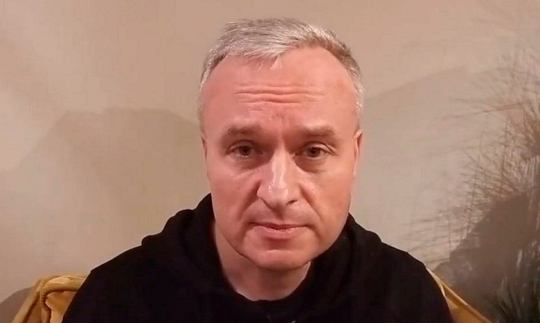
In 20 years at Gazprom, I have not met many people who blindly believe the Kremlin's narrative.
Igor Volobuyev, a senior Gazprom manager who fled to Ukraine, is interviewed by Victoria Belyashin.
Viktoria Belyashin: In an interview you said that you had to wash away the "Russian past".
Igor Volobuyev: For me, leaving Russia and the whole life I built there for many years is penance. I left because I wanted to be honest with myself. Today I have nothing. Neither foreign bank accounts nor real estate. Today I am 50 years old, I have lived a life, quite a good one. And now I have nothing.
You were born in Ukraine, but spent most of your life in Moscow. Have you now returned to your homeland?
- I came back to share the fate of my people. Many Ukrainians have lost everything: their homes, loved ones, and often their lives. I am not their equal, but I want to be alongside them.
It is now very difficult to enter Ukraine with a Russian passport. How were you checked?
- I cannot disclose the details. It was not easy. Many people helped me. Not because they think I am a good person. I am useful. Many made it clear to me that even the fact that I am talking to you now and revealing the truth about the Russian regime is an important task that can help Ukraine.
You have Russian citizenship.
- But I have always felt Ukrainian. I came to Moscow to study in 1989. I graduated from the Oil and Gas Institute, but I didn't want to work in the profession. Initially, I started working as a journalist, quickly got accredited by Gazprom, and after a few years I was offered a job within the company's structures. So I stayed in Moscow, for more than 30 years. I worked at Gazprom and later at Gazprombank for a total of 23 years.
The move to Gazprombank was not a promotion for you, was it?
- I treated it as an exile. I was transferred because of my Ukrainian roots. In 2014, I took part in the so-called peace marches, actions against the war with Ukraine, organised by the oppositionist Boris Nemtsov. In my car, in the place where many Russians hang St George ribbons, I hung a ribbon in the colours of the Ukrainian flag. I also put a sticker on the car saying 'I am Ukrainian. We are not enemies'.
At the time, I was head of Gazprom's PR department. I never hid my views at work. When my colleagues asked me what I thought about, for example, the Maidan, I always answered honestly and emphasised the independence of Ukraine. I was not afraid to say that what Putin was doing was a crime and that he was leading Russia into an abyss.
What were the reactions?
- Some people objected, said that I allowed myself too much and that I must have forgotten where I work. But such people are in the minority, even in a company like Gazprom. In more than 20 years of working there, I haven't met too many people who would blindly believe the Kremlin's narrative. Therefore, many understood me perfectly. Because most Russians realise that Russian power is criminal. And that what Putin is doing is terrible, harmful and dangerous, above all for the citizens of the Russian Federation.
The vast majority are simply afraid. For over 20 years Putin has done enough to drive people into the tarmac, to reassure them that they have no rights.
Have those who hold high positions say anything today?
- They - nothing. The higher a person is, the more each word will cost them.
You were transferred from Gazprom to Gazprombank because of your Ukrainian roots. But that isn't how they justified it?
- It is apparent that you are used to democracy. In Russia, people are fired 'for their beliefs'. One day the management called me into the office. I was told that they knew that I was 'not with them' and therefore I could no longer work at Gazprom. However, they offered me a transfer to Gazprombank, stressing that I would not be dealing with particularly serious things there. So it is difficult to speak of repression, I was immediately given an alternative, but the message I got was clear: "We know you are not loyal".
It is not uncommon for large state-owned companies to employ former functionaries from the structures of the state power.
- Gazprom is no different. Of course, these people do not wear uniforms and epaulettes. Everyone knows that someone is an ex-military officer, but they do not talk about it. I know that there are people at Gazprom who used to work with Putin in the KGB. I will not name names, but these are people who are said to have been 'sent from above'. Nobody hired them. Putin chose them. Such people, even though they hold high positions, usually do not know much about the job and even profane it.
How?
- For example, one of the vice-presidents, who served with Putin, sometimes spoke such nonsense at press conferences that if he didn't have his back, he would have been fired long ago.
What tasks do these people have?
- The main task of most is to receive a very high salary and live a very lavish lifestyle. But not only that. And this does not apply only to Gazprom. In most large state-owned companies there is a so-called "superintendent", an FSB functionary who holds a civilian position, such as deputy director general or board member, whose duties include keeping track of what is going on in the company. We are dealing with a state in which Chekists still hold sway.
I understand correctly that for at least eight years you were actually forbidden to be Ukrainian in your job, but you nevertheless continued to do it?
- I find it hard to explain, it was easier for me to leave the country than to think about it. For the last eight years I had a hole in my heart. It was a conflict of interest. My work contradicted my beliefs. Today I think that every person has a limit. When he reaches it, he understands that he can't go on like this any longer.
I wanted to leave earlier, in 2014. Even then, after the annexation of Crimea and the outbreak of war in Donbass, I understood that Russia had no future. I cannot say why I held back for so many years. These were family matters that I don't want to talk about publicly.
Putin is not only about the war in Ukraine. Have you been disturbed by what has been happening in Russia over the years - persecution of the opposition, repression, human rights violations and the eradication of democracy?
- Until 2013, I lived in the belief that Putin was ok. I was loyal. And propaganda worked on me, I had no need to look for alternative sources of information. I remember that when I came to Ukraine in 2008, turned on the TV and saw the Ukrainian version of the war in Georgia, I was shocked. But I didn't really care either. I knew nothing about Georgia, it didn't concern me, I didn't wonder whether this Saakashvili is a fascist, as Russian TV said, or not.
It was only when she touched on what was close to me, started telling me that the Ukrainians were persecuting the Russian-speaking community in Ukraine or that the people on the Maidan were bribed and base, that I felt anger. After all, I am a Russian-speaking Ukrainian! So are my family and friends living in Ukraine. And no one has persecuted anyone! I saw Maidan with my own eyes, I know people who were involved in the fight for freedom, I knew that no one was paying them for it. Then I felt cheated.
How is it possible that you did not realise this beforehand?
- It is also difficult for me to understand. Because it seems that all these years I didn't know what country I was living in. I was asleep, like many Russians today.
The war against Ukraine is not only about military action, but also about information wars, which have been going on for many years, aimed at discrediting Ukraine in the international arena, and about the so-called gas wars.
- The aim was to prevent Ukraine from pulling out towards the West. In fact, Gazprom has little to do with business; it is above all a weapon of the Kremlin, which it uses to subjugate or punish anyone.
An example?
- Let us compare gas prices at the end of the year in Poland and Belarus. Poland, which has always referred to Russia as a threat, was selling 1 000 cubic metres of gas for around USD 850, and Belarus for USD 30. How else can we explain this? It is not the distance or the cost of transporting the gas, it is a stone's throw away.
How was this policy discussed within the company?
- It was clear to everyone that decisions are not made by us, but in the presidential administration.
You were also involved in these wars. What tasks did you have?
- Unfortunately. The first 'gas war' took place at the turn of 2005 and 2006, when Yushchenko appeared, announcing that Ukraine was taking a course towards the West. And the second in 2008 and 2009, in reaction to the NATO summit and the war with Georgia. My job was to reassure Europe that the Ukrainian system was failing, that the pipes were rotten and that rebuilding the system was too expensive and easier to abandon. I developed theses that Ukraine has no money, Ukraine is stealing from us. We created an image of Ukraine as an unscrupulous buyer and a partner that is better avoided.
We managed to make Ukraine discredited in the eyes of the world as a reliable supplier. Gazprom has contributed greatly to this. Thanks to this, the decision was made to build gas pipelines that bypass Ukraine: Nord Stream, Turkish Stream, Nord Stream 2. Ukraine was deprived of its status as a transit country.
Who coordinated this?
- We received all orders from above. Instructions were received by the chairman of the board, Alexei Miller, who has contacts with the Kremlin.
During the second 'gas war' everything was led by Alexei Gromov, who was then deputy head of the presidential administration. To this day he is a grey eminence, managing Gazprom's information policy. I guess it's enough to understand how it worked, if on the strips of state news agencies TASS and RIA Novosti, there were statements by Gazprom representatives that no one at Gazprom knew about. A spokesman told me that he read on the strips statements he had never made.
Are you aware of your responsibility?
- I know that it is double. I worked doubly hard for the Russian authorities because I am Ukrainian.
Have you kept in touch with the Ukrainian part of your family all these years?
- Very regularly. Several times a year I would come to my hometown, visit my father, my family, my loved ones.
What then changed in February?
- When this full-scale, completely crazy, medieval war started, something inside me broke. That day, from the very morning, friends and acquaintances from all over Ukraine were writing to me. I did not recognise these people. They called and, in terrified, hard-to-recognise voices, said basically one thing: 'do something!' They said they were killing them.
I was born in Ochtyrka, a town 50 km from the Russian border that was invaded by the Russians at the very beginning of the war. One of the settlements was almost completely razed to the ground...
How did you feel?
- Disgusting. Because I was aware that I was living so well in Moscow, and I was looking at photos and videos showing what was happening in Ukraine. Not footage of journalists or politicians, but of my family, so it didn't occur to me to question this content. And many wrote to me directly that they were ashamed of me, that they felt disgusted with me. In one message, I read that if I don't do something, I will no longer have the right to say that I am Ukrainian and that my hometown is not Moscow, but Ochtyrka.
I realised that I could no longer go to that job, say hello to those people, smile and then watch the war on my mobile phone, like a terrible film, pretending that it didn't affect me.
I needed a few days, but I chose my homeland. I packed my bags and flew out of Russia on 2 March. At the time, my father was hiding from Russian bombs in an unheated basement and later evacuated to Slovakia. And he never did any reproach to me.
You did not inform your employers of your departure.
- I did not fire myself, I did not give notice. When I left the country, I was vice-president of Gazprombank, my duties included promoting the bank's industrial assets.
Did they contact you afterwards?
- I have not been in contact with anyone from Russia since I left. I have talked to people from Russia who have also left. But with those who are in Russia, I don't talk.
This year alone, four top Gazprom executives have died in mysterious circumstances.
- For the Russian authorities to kill a man is normal. It has been so for years.
I don't believe they committed suicide. Vladislav Avayev was the first vice-president of Gazprombank. Nobody knows exactly what he did. But he should have had access, for example, to the account details of VIP clients, to information about their income. In my opinion, he knew too much or said something unnecessary. Such deaths will happen again and again.
You know a lot, too, and you're still talking about it to the media. Are you afraid?
- I know they can get me anywhere. But I also hid in Russia. I couldn't look in the mirror, I was ashamed. In Russia, it's hard for those who act according to their conscience to live, because the system does terrible things to them and everyone knows that it can do whatever it wants to a person. But if you oppose it, at least you live in harmony with yourself.
And what can you say about former Western politicians who have found warm jobs at Gazprom?
- The term "Schroderisation of Europe" is popular with us. Please understand, for the Western political elite, Putin is a devil who is very good at tempting. The space for corruption to flourish was enormous.
Why have you only now decided to leave your job?
- For the time being, they didn't take me into territorial defence, they said there was no need yet to mobilise people like me. In the first days of the war I saw pictures of queues to military offices. I understood that even people without combat experience were ready to grab their weapons. I understood how solidary Ukrainians are today. I hope to be able to stand with them in one line. Until Ukraine is victorious, I will not leave it.
You came to Ukraine to fight.
- Think about what you would choose if you had to choose between your family and your homeland. Can you find the answer today? I have not been able to for all these years.
Source in Polish
#kremlin#russia#ukraine#war in ukraine#vladimir putin#europe#russian invasion of ukraine#gazprom#russian propaganda#russian imperialism#ruschism#україни#Россия#stop putin#putin
10 notes
·
View notes
Text
Instant où un bulldozer a percuté le point de contrôle de l'armée sioniste et exécution de son conducteur
#israël#israel#occupation#crimes#terrorisme#terroriste#apartheid#sioniste#sionisme#stand with palestine#palestinian lives matter#palestine#free palestine#gazprom#free gaza#gaza#resistance#résistance
1 note
·
View note
Text
Daily(ish) Wrap Up September 3-4, 2022
Under the cut:
Ukraine’s and Europe’s largest nuclear plant was once again knocked offline in the early hours of Saturday amid sustained shelling that destroyed a key power line and penetrated deep into the plant’s premises
A fleet of 13 ships carrying more than 280,000 tonnes of grain and agricultural products left ports in Odesa on Sunday, according to Ukraine’s ministry of infrastructure
Russian forces have hit multiple residential targets in the south central part of Ukraine overnight
Russian troops launched overnight rocket attacks on Kramatorsk and Sloviansk in eastern Ukraine
The Russian energy major Gazprom extended the shutdown of gas flows through its key Nord Stream 1 pipeline to Germany on Friday evening, providing no timeframe for a reopening
“Ukraine’s and Europe’s largest nuclear plant was once again knocked offline in the early hours of Saturday amid sustained shelling that destroyed a key power line and penetrated deep into the plant’s premises, local Russian-backed authorities said.
The claims came barely a day after a team of inspectors from the UN nuclear agency arrived at the Zaporizhzhia nuclear power plant, which has been caught in fierce recent fighting between Ukrainian and Russian forces, six months after the Russian president, Vladimir Putin, ordered his troops to invade Ukraine.
The IAEA’s mission is meant to help secure the site as Moscow and Kyiv trade blame for shelling at and around the nuclear plant.
“The Dneprovskaya power line has been hit. The nuclear power plant has switched to servicing its own needs,” Vladimir Rogov, a member of the Kremlin-appointed regional administration, wrote on Telegram, adding that a shell had struck an area between two reactors. His claims could not be immediately verified.
Late on Friday evening, the Russian-backed authorities reported that the plant had been under fire for about two hours, blaming Ukrainian forces in the latest of a series of similar claims.
As of Saturday morning, neither the Ukrainian government nor the country’s nuclear energy operator, Enerhoatom, had commented on these allegations.
The plant has repeatedly suffered complete disconnection from Ukraine’s power grid since last week, with Enerhoatom blaming mortar shelling and fires near the site.
Local Ukrainian authorities accused Moscow of pounding two cities that overlook the plant across the Dnieper river with rockets, also an accusation they have made repeatedly over recent weeks.
In Zorya, a small village about 20km (12 miles) from the Zaporizhzhia plant, residents on Friday could hear the sound of explosions in the area. It was not the shelling that scared them the most, but the risk of a radioactive leak in the plant.
“The power plant, yes, this is the scariest,” said Natalia Stokoz, a mother of three. “Because the kids and adults will be affected, and it’s scary if the nuclear power plant is blown up.”
Oleksandr Pasko, a 31-year-old farmer, said: “There is anxiety because we are quite close.” Pasko said the Russian shelling has intensified in recent weeks.”-via The Guardian
~
“A fleet of 13 ships carrying more than 280,000 tonnes of grain and agricultural products left ports in Odesa on Sunday, according to Ukraine’s ministry of infrastructure.
The ministry said it was the single largest shipment of produce to leave Ukraine since the country brokered an export deal with Russia, the UN and Turkey on 22 July. The grain initiative was signed to try and avert a global crisis and ensure the safe transport of wheat and other essential products, such as sunflower oil.
The delivery from ports in Odesa, Chornomorsk and Pivdenny on Sunday will go to eight countries. So far, 86 ships have left Ukraine to export produce to 19 countries since 1 August, the ministry said.”-via The Guardian
~
“Russian forces have hit multiple residential targets in the south central part of Ukraine overnight, according to Vitaliy Kim, governor of Mykolaiv.
Posting on his Telegram account, he said that Russian shelling had damaged homes, three hospitals, two education facilities, a hotel and a museum in the area.
Kim said the targets included a private house destroyed by a missile in the village of Vysunsk, Bereznehuvate, where one child is reported to have died and three others have shrapnel injuries.
He said the city of Mykolaiv was subjected to “massive rocket fire” overnight from Saturday into this morning, with many municipal buildings damaged and one person reported as injured so far.”-via The Guardian
~
Russian troops launched overnight rocket attacks on Kramatorsk and Sloviansk in eastern Ukraine, according to the governor of the Donetsk region, Pavlo Kyrylenko.
In an update posted to his Telegram account, Kyrylenko said:
In Kramatorsk, a rocket hit a food enterprise, injuring a person. Another one hit a light industry enterprise. A fire broke out there.
Russian forces also struck two enterprises in Sloviansk, damaging several houses, Kyrylenko added.
Vadym Liakh, the mayor of Sloviansk, confirmed the city was under attack, writing on Facebook:
The city was shelled again. There were loud explosions on the outskirts. In Bylbasivka, private houses were damaged on Shkilna and Yaseneva Streets.
-via The Guardian
~
“The Russian energy major Gazprom extended the shutdown of gas flows through its key Nord Stream 1 pipeline to Germany on Friday evening, providing no timeframe for a reopening.
The move came hours after G7 countries agreed to impose a price cap on Russian oil in an attempt to stem the flow of funds to Vladimir Putin’s regime.
Gazprom, the state-owned oil and gas firm, said supplies would remain halted indefinitely after a leak was detected. It said the pipeline would not restart until repairs were fully implemented.
Nord Stream 1 is the single biggest pipeline for gas from Russia to Europe and has the capacity to deliver 55bn cubic metres (bcm) of gas a year. Continued supplies through the pipeline are seen as crucial to prevent a deepening of the energy crisis.”-via The Guardian
27 notes
·
View notes
Text
Gazprom reduces gas supplies to Italy, France cut off
New Post has been published on https://www.timesofocean.com/gazprom-reduces-gas-supplies-to-italy-france-cut-off/
Gazprom reduces gas supplies to Italy, France cut off

Rome (The Times Groupe)- Italian energy company Eni announced Friday that Gazprom will cut its gas supplies to Italy by 50%. france
Over the past few weeks, Moscow has cut off or reduced gas deliveries to several European Union countries, which have imposed sanctions on Russia due to its invasion of Ukraine.
France also has not received any Russian gas via Germany since May 15, according to French network operator GRTgaz.
Maintenance issues at the Nord Stream 1 pipeline from Russia to Germany were blamed by Russian officials.
Russia supplies around 40% of Italy’s imported gas, though it is trying to reduce this dependence. Through its network connections with Germany, France receives around 17% of its gas from Russia.
Gazprom’s gas deliveries to Italy were already reduced by 15% on Wednesday and 35% on Thursday this week.
Italian Prime Minister Mario Draghi, who was in Kyiv with German and French leaders, rejected Gazprom’s “technical reasons” as an explanation.
“Both Germany and us, and others, believe these are lies. In reality they are making a political use of gas like they are using grain for political use,” Draghi said at a news conference in Kyiv with German Chancellor Olaf Scholz and French President Emmanuel Macron.
This week, Gazprom cut deliveries to Germany by more than 60%. Russian state-owned company said delays in Siemens’ repair work were to blame for the reductions in supply via the undersea Nord Stream 1 pipeline.
However, Germany said Gazprom’s move was politically motivated.
The Nord Stream 1 pipeline is the main Russian gas pipeline to Europe after gas flows through Ukraine were reduced by the war.
Paul Gentiloni, the EU’s Economy Commissioner on Thursday, warned that the bloc’s economy could enter a recession if Russian gas supplies ceased, but said that so far there had been no signs of this.
#energy news#eu gas crisis#France#france gas crisis#French network operator GRTgaz#French President Emmanuel Macron#Gazprom#German Chancellor Olaf Scholz#germany news#Italian energy company Eni#Italian Prime Minister Mario Draghi#Italy#italy gas crisis#Nord Stream 1 pipeline from Russia to Germany#russia news#Russia Ukraine War#Russian gas pipeline to Europe#The Times Groupe#Times Of Ocean#Unravel News#world gas crisis#world latest news#Politics
2 notes
·
View notes